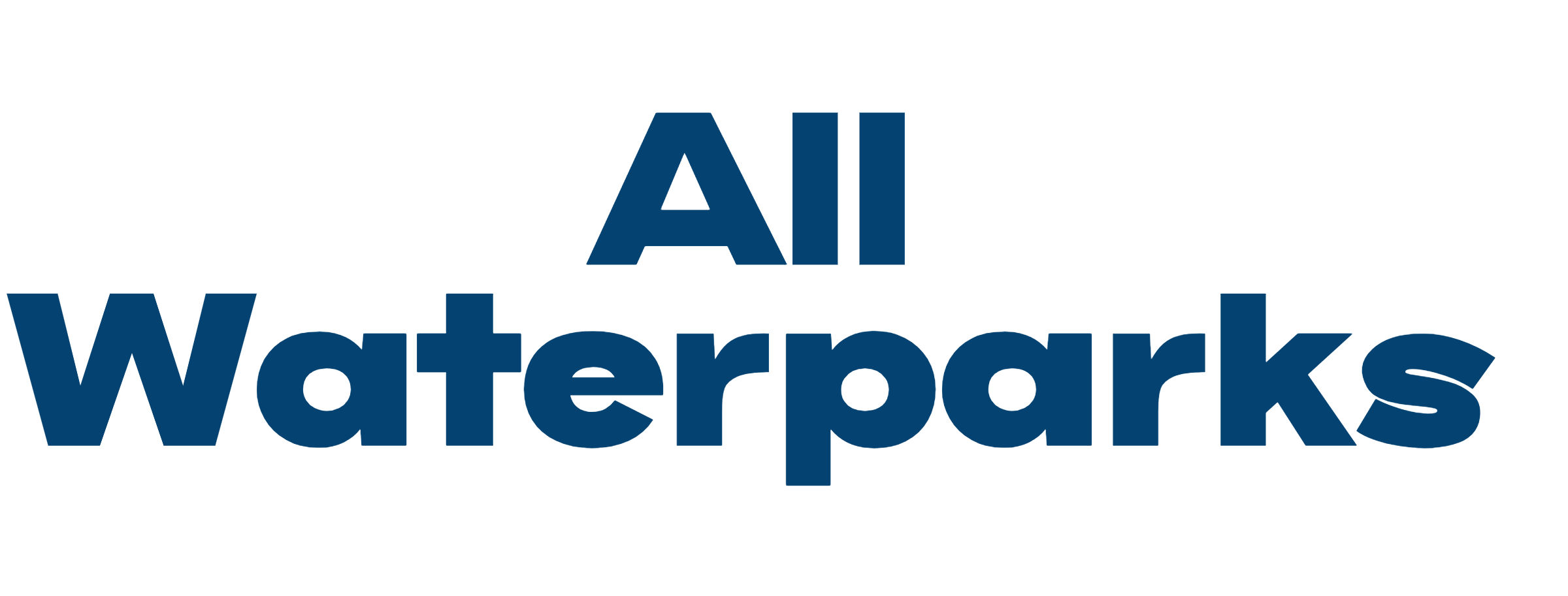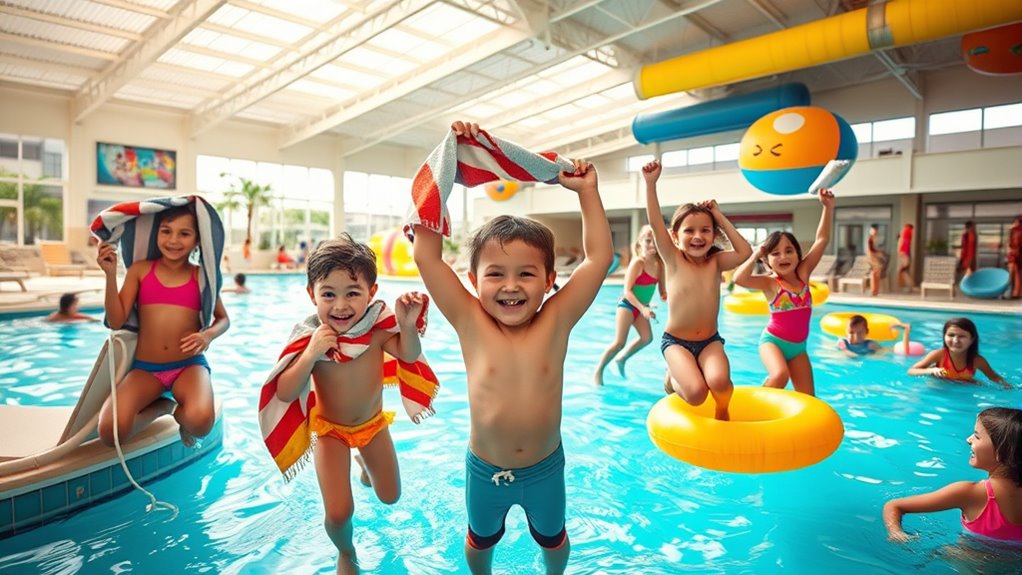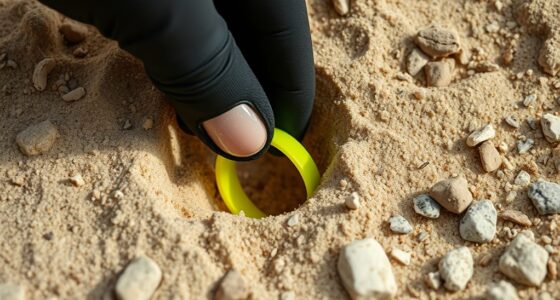At indoor water parks, towel policies vary—some provide free towels, while others charge fees or restrict outside towels. You often check out towels with wristbands or cards and must return them daily to avoid extra charges. Bringing your own towel can save money, provide better hygiene, and offer more comfort. To uncover all the tips on managing towel use at water parks, keep exploring for helpful advice.
Key Takeaways
- Water parks vary: some offer free, sanitized towels, while others charge rental fees or require towel purchases.
- Bringing personal towels can save money and ensure hygiene, especially if rental policies are strict or fees high.
- Towels are generally checked out and returned daily; failure to return can incur hefty fees or charges.
- Many indoor water parks designate towels for indoor use only and recommend leaving used towels in the park after use.
- Consider using waterproof bags for wet towels and plan ahead based on the park’s specific towel policies.
Understanding Towel Availability at Water Parks
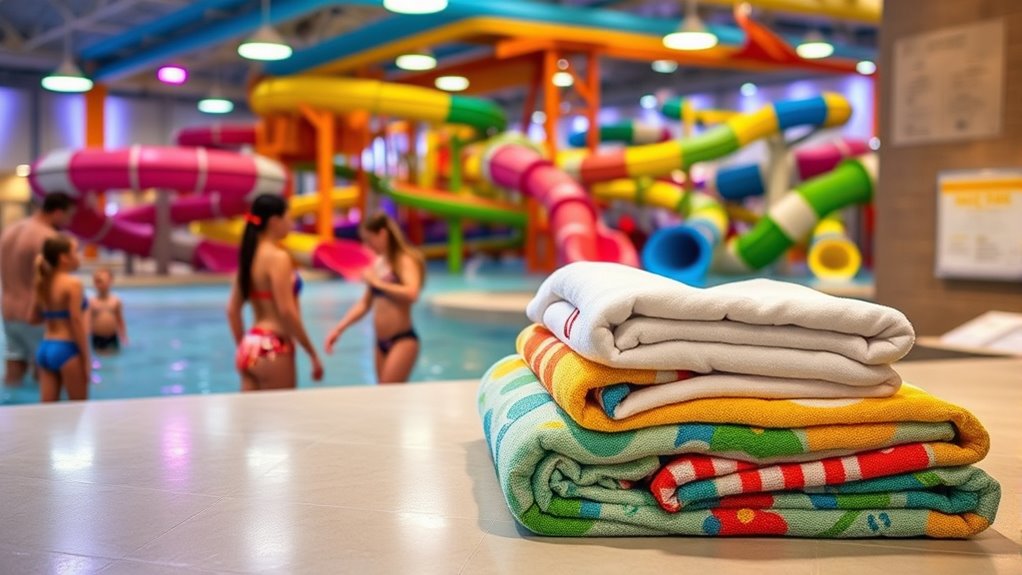
Understanding towel availability at water parks can vary considerably depending on the property. At some parks like Great Wolf Lodge, towels are provided free of charge for use inside the water park, and they typically stay within the park for laundering. Other parks, such as AquaShow Park, charge a fixed fee plus a security deposit for towel rentals, with no refund if the towel is lost. Some water parks sell towels directly at on-site shops, giving you the option to purchase your own. Policies differ widely, and there’s no industry standard, so it’s essential to check each park’s rules beforehand. Keep in mind, towels are generally available for all guests, but costs, deposit requirements, and whether towels stay in the water park can vary substantially. Towels are routinely replenished and available in large quantities to meet guest demand. Familiarizing yourself with the herbal remedies policies can help ensure a smooth visit and avoid unexpected charges or inconveniences.
Towel Limits and Check-Out Procedures
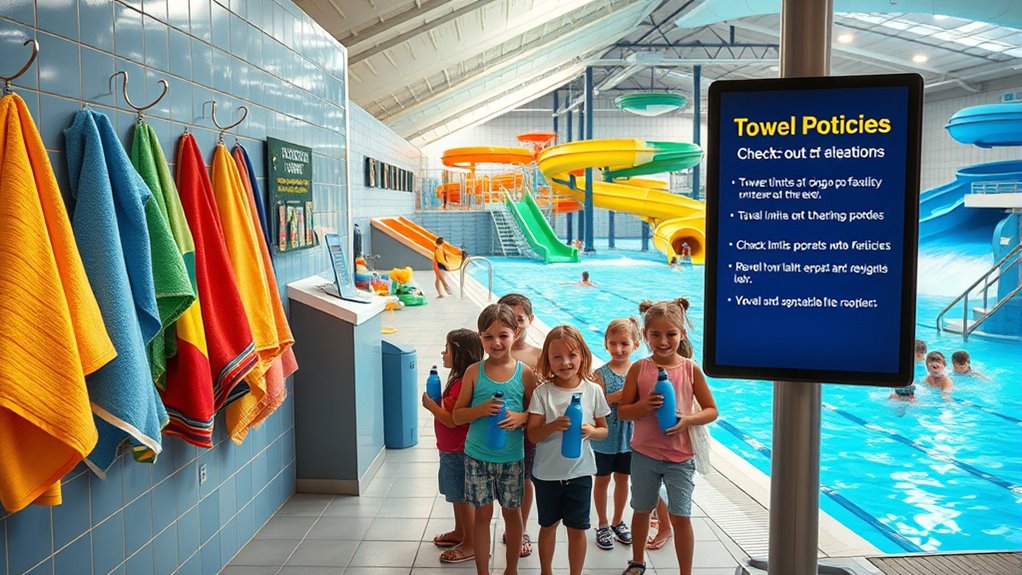
Towel limits at indoor water parks are typically managed through the use of towel cards issued to each guest upon check-in. These cards usually allow you to check out one towel at a time, but you can exchange towels multiple times during your stay. Outside guests often need to purchase a towel card or pay a fee, usually around $3 per towel or person. Towels must be returned daily to avoid extra charges—often $25 per towel if left unreturned. Many water parks also enforce a maximum number of towels per guest to ensure availability for all visitors. To maintain proper towel inventory management, staff often monitor towel check-outs and returns closely. – Towel cards track how many towels you can use – Guests are encouraged to exchange towels daily – Returning towels on time prevents fees – Lost towels result in replacement charges
Returning Towels and Avoiding Fees
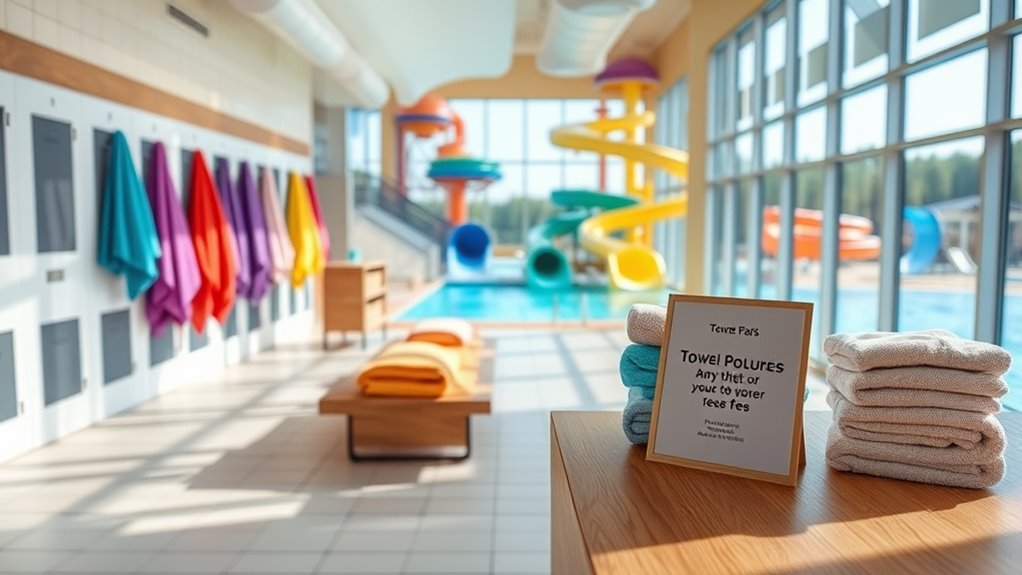
Make sure you return your towels on time to avoid extra charges, as many resorts have strict deadlines. Missing the return can lead to hefty fees, especially if towels aren’t returned by check-out or designated staff. Staying aware of these policies helps you keep costs down and avoid unexpected expenses. Towel policies vary by resort, so always check the specific water park’s guidelines before visiting. Being familiar with towel management practices can also prevent misunderstandings during your stay.
Towel Return Deadlines
To avoid fees at indoor water parks, it’s important to pay attention to their towel return deadlines. Many parks have specific policies to ensure towels are returned promptly. For example, at Kahuna Laguna Water Park, towels and life jackets not returned by check-out may incur charges. Kalahari Resorts require towels to be returned daily; otherwise, a fee applies. Some parks don’t specify a deadline but expect towels to be returned after use, while others have no return requirement at all. If you purchase towels, there’s no deadline since you own them. Missing deadlines can lead to charges, so always check the park’s specific policy to avoid unnecessary fees. Additionally, understanding towel policies can help you plan better and avoid unexpected expenses during your visit.
Penalties for Missing Towels
Have you ever wondered what happens if you forget to return your towel at an indoor water park? If you don’t return it, you may face penalties or fees. Towels need to be returned to designated areas, like towel return stations or attendants, to avoid charges. While specific fees aren’t always detailed, many parks warn that unreturned towels could lead to charges or lost towel fees added to your bill. Some parks track towel usage, so returning your towel on time is vital. If you prefer, you can purchase a towel instead of risking penalties. Remember, some parks prohibit outside towels, so use or rent their towels and return them promptly to avoid extra costs. Clear communication about these policies helps prevent surprises. Towel policies also vary by park, so reviewing their rules beforehand can help you stay compliant.
The Benefits of Using Park-Provided Towels
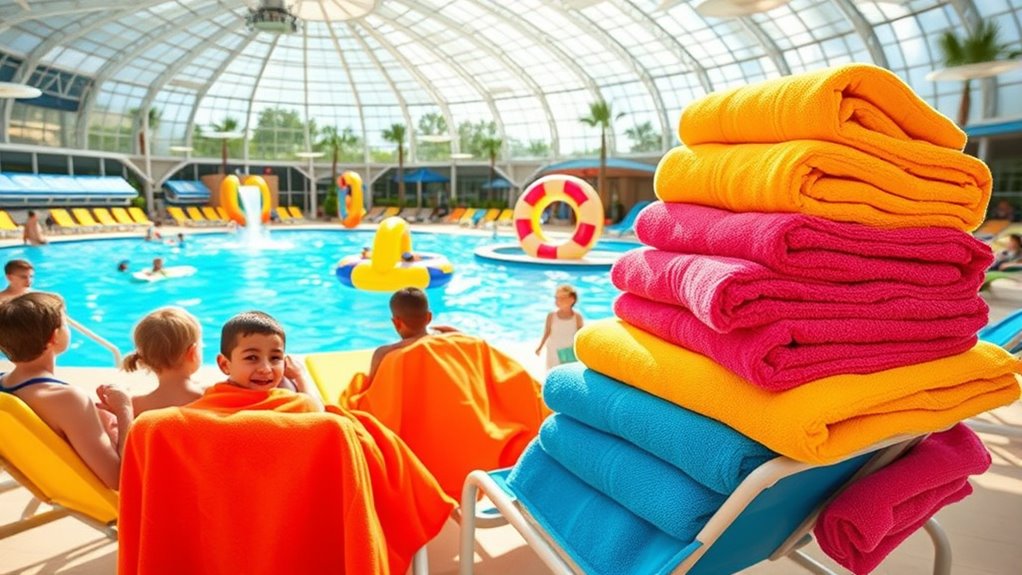
Using park-provided towels offers you greater convenience by eliminating the need to pack your own and ensuring easy access throughout the park. They also promote better hygiene because they’re regularly cleaned and made from high-quality materials, reducing the risk of bacteria. Using organic and natural materials helps ensure these towels are safe and environmentally friendly. Overall, these towels help you enjoy a more comfortable, stress-free water park experience. Additionally, since towels are now available free of charge for all guests at Walt Disney World water parks, you no longer need to worry about rental fees or bringing your own towels. The change was prompted by increased guest complaints.
Convenience and Accessibility
Indoor water parks that provide complimentary towels make your visit more convenient and accessible by eliminating the need to pack or rent your own. This reduces luggage and simplifies your day, allowing you to focus on fun instead of logistics. Plus, you save money since you don’t need to buy or rent towels elsewhere. Having park-provided towels also enhances your experience by removing the hassle of managing personal ones. The park can efficiently handle towel distribution, making everything run smoothly. You spend less time searching for towels and more time enjoying attractions. Overall, this service streamlines your visit, making it easier to relax and have fun without extra steps. Proper towel management also supports hygiene standards, ensuring guests have access to clean, high-quality towels, which contributes to a safer environment and better guest satisfaction. Additionally, guest satisfaction is often improved when facilities prioritize cleanliness and convenience.
Hygiene and Cleanliness
Park-provided towels play a key role in maintaining hygiene and cleanliness during your water park visit. They are regularly washed and disinfected, reducing the risk of bacterial contamination and fungal growth common with personal towels. Because these towels are stored properly and monitored by trained staff, they meet strict health standards, minimizing skin irritations and infections. Using park towels also helps prevent the spread of bacteria and fungi, protecting your skin and health. In contrast, personal towels that aren’t washed often can harbor bacteria, fungi, and other pathogens, increasing health risks like skin infections or eczema flare-ups. Additionally, regular laundering of park towels at high temperatures ensures the removal of microbes and prevents microbial buildup, further safeguarding your health. Proper towel hygiene is especially important considering the impact of sleep deprivation on immune function and skin health, emphasizing the benefits of using sanitized, health-compliant towels.
Advantages of Bringing Personal Towels
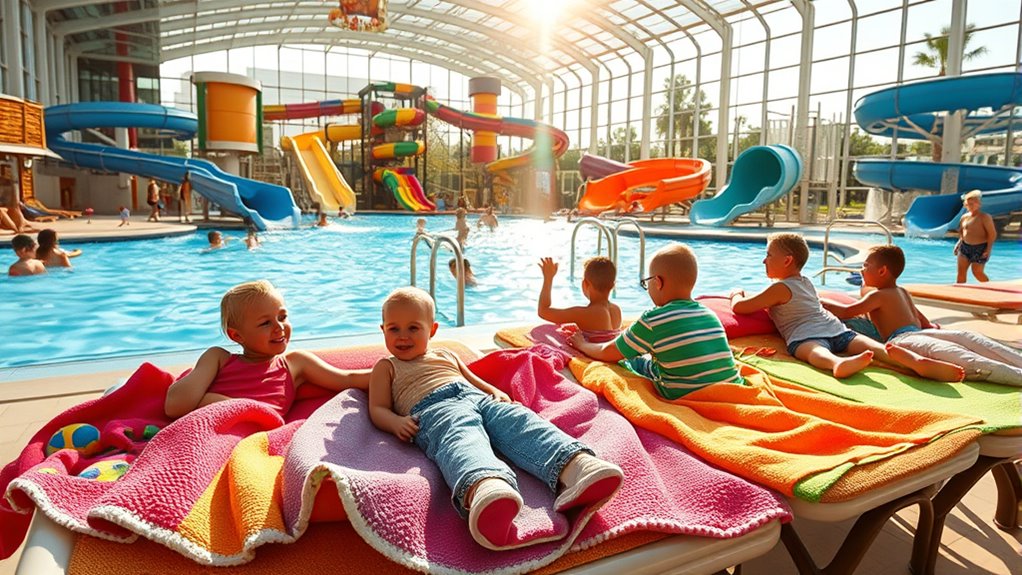
Bringing your own towels to water parks offers several practical advantages. You gain better control over hygiene and can choose towels that suit your preferences, such as size or material. It also saves money by avoiding rental fees, especially if you’re a frequent visitor. Convenience is another benefit—your personal towel is always ready, so you don’t waste time waiting in line or searching for rentals. Additionally, having your own towel allows you to select quick-drying or extra-absorbent options, making drying off easier. Reusing your towel also benefits the environment by reducing waste from single-use or rental towels. Overall, bringing your own towel ensures comfort, saves money, and promotes hygiene during your water park visit.
- Better hygiene control and personal preference
- Cost savings over rental fees
- Increased convenience and instant availability
- Environmental benefits through reuse
Policies on Towel Trading and Sharing
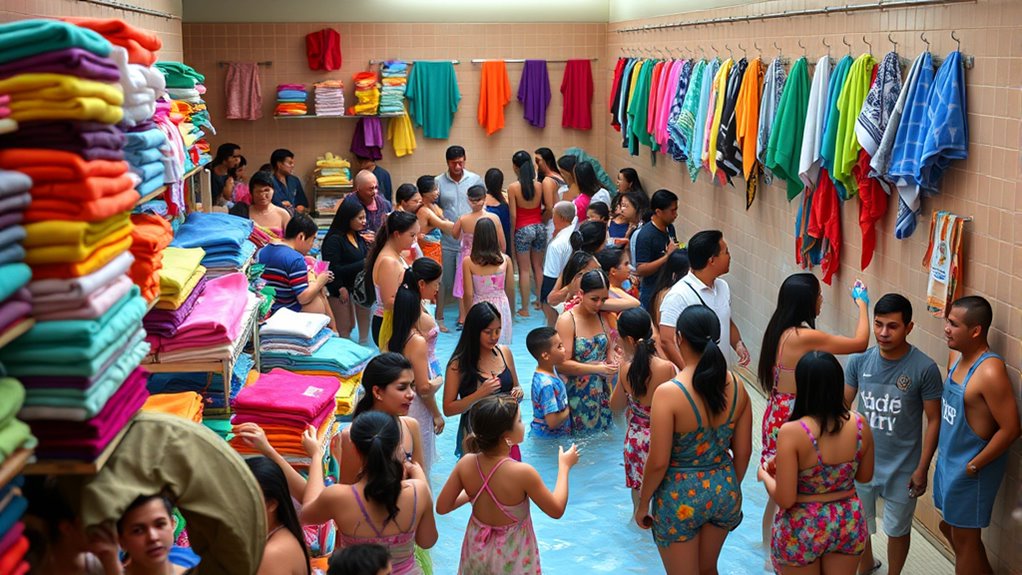
Many water parks have specific rules about trading and sharing towels to keep things organized and hygienic. You can often exchange towels during your visit, but trading with other guests or outside towels is usually restricted. Understanding these policies helps you stay within the rules and avoid extra charges or issues. Some parks offer towel service or provide towels at no cost, which can make packing easier and ensure you always have a clean towel available. Additionally, knowing about the financial impact of these policies can help water parks improve guest satisfaction while maintaining safety standards.
Towel Trading Regulations
Towel trading and sharing are generally restricted to guarantee proper accountability and prevent loss. You can swap wet towels for dry ones during your visit, but only through official staff stations. Personal towel trading between guests is typically not allowed, maintaining control over towel distribution. Towels are checked out at entry points using wristbands or electronic systems, linking each towel to a guest’s account. If you forget to return a towel, a fee ranging from $15 to $30 applies automatically. Towels must be returned to designated areas, not hotel rooms or other locations. During peak hours, towel availability may be limited, but continuous swapping is permitted. All policies aim to prevent theft, loss, and confusion, with clear communication at check-in and towel stations. Recognizing the importance of narcissistic traits can help staff identify problematic behaviors that may impact the management of towel policies.
Sharing Policies and Limits
Indoor water parks generally do not have official policies permitting guests to share or exchange park-provided towels, and most have discontinued free towel service for day visitors, encouraging guests to bring their own or purchase towels. There are no explicit bans on sharing personal towels, but parks do not promote or endorse towel sharing among guests. Policies focus more on towel return and restrict towel use to designated guests, especially at resorts where towels are only provided to overnight guests. No parks specify a limit on how many people can share a personal towel, and there’s no mention of hygiene or health concerns related to towel sharing. Staff rarely monitor towel use, and policies mainly aim to prevent towel loss rather than regulate guest-to-guest sharing.
Guest Preferences: Comfort and Hygiene
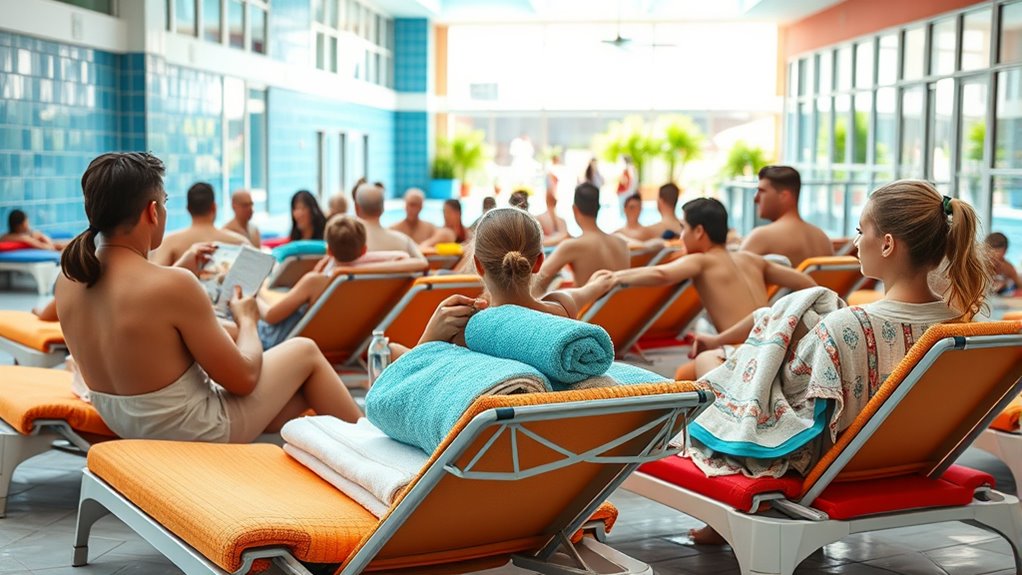
Guests prioritize both comfort and hygiene when it comes to towels at water parks, influencing their overall experience. You want towels that feel soft, are absorbent, and meet your cleanliness standards. Some parks provide towels, like Great Wolf Lodge and WaTiki, making it easy to stay comfortable without bringing your own. Others, like Buffaloe Road, require you to bring your own towel, so hygiene and quality become your concern. You may prefer personal towels to control material, size, and cleanliness. The quality of provided towels varies, affecting comfort, while policies ensure towels are kept hygienic through regular laundering. Regular laundering guarantees cleanliness standards and is part of maintaining a hygienic environment. Convenient access to towels, whether provided or brought, enhances your visit and satisfaction.
Safety Considerations for Towel Use
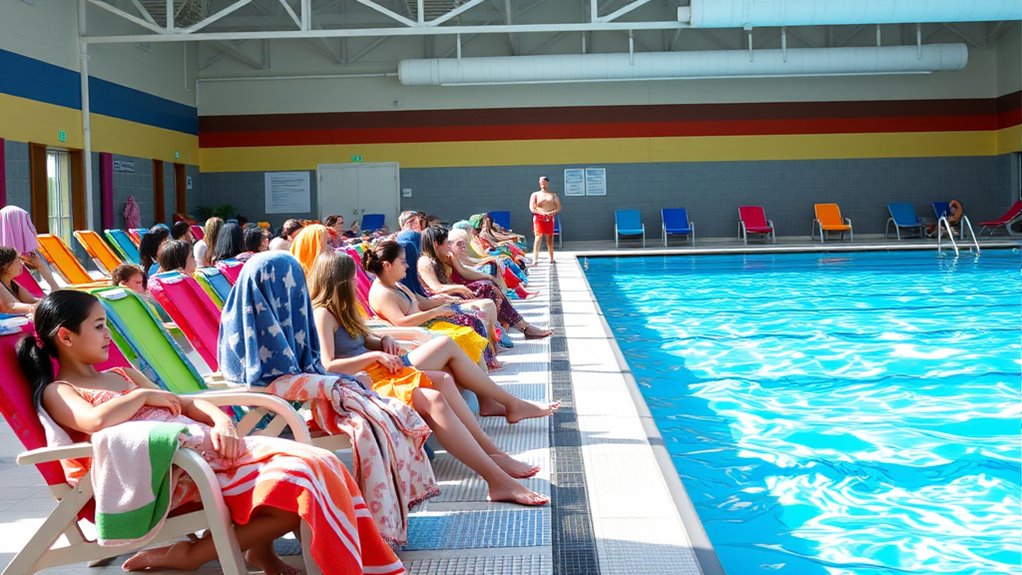
Using towels safely at water parks is essential to prevent accidents and reduce health risks. Towels can harbor bacteria, fungi, and residual chemicals if not properly cleaned, increasing infection and skin irritation chances. Personal towels lower the risk of transmitting skin infections like ringworm or athlete’s foot, especially since shared towels can spread microbes. Wet or damp towels left unattended may become breeding grounds for microbes, transferring to your skin. Towels used in chlorinated waterparks can retain chlorine, causing irritation or allergic reactions if not rinsed properly. Guests with sensitive skin benefit from their own towels to avoid allergens or residues. Additionally, towels left on pool decks can cause slips and falls. Proper storage and timely removal of towels help maintain safety, hygiene, and prevent accidents. Proper towel management also ensures staff can monitor for potential hazards on the deck area. Maintaining hygienic towel practices is crucial to overall water park safety.
Environmental Impact of Towel Policies
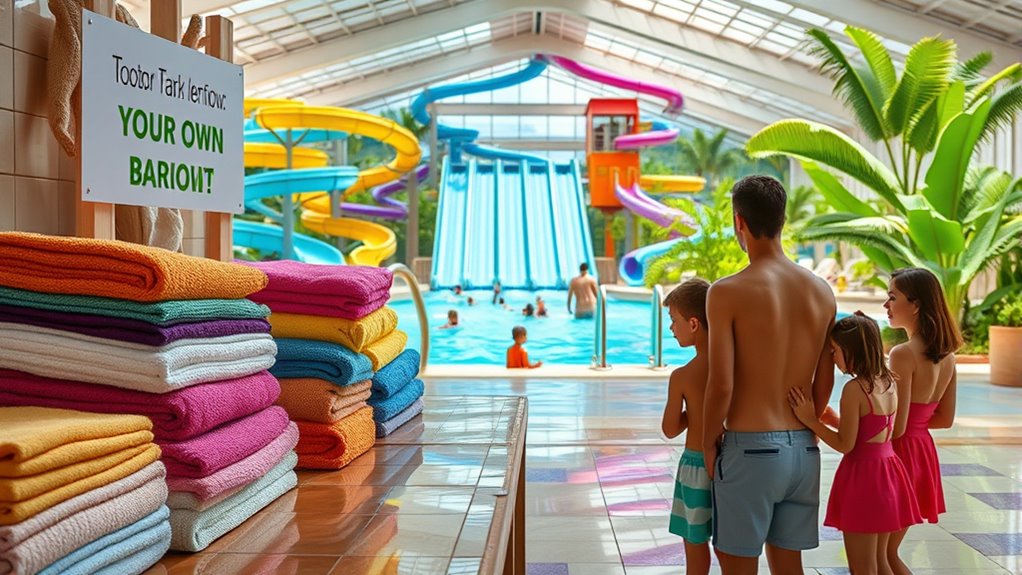
Implementing towel policies at water parks has a significant impact on the environment, especially regarding resource consumption and waste generation. When you choose reusable towels made from sustainable materials, you help reduce water and energy use associated with laundering. Durable towels that dry quickly and stay soft lessen the need for frequent replacements, cutting down waste. Promoting policies where guests bring their own towels lowers the laundering load, conserving water and electricity. Additionally, using eco-friendly detergents and efficient washing machines minimizes chemical pollution and energy consumption. Recycling worn towels or repurposing them prevents landfill waste. Water conservation efforts are supported when towel policies encourage reusing towels, decreasing the demand for new products and reducing overall ecological footprints. Durable towels that dry quickly and stay soft can also reduce the frequency of laundry loads, further conserving resources.
Tips for Managing Towel Needs During Your Visit
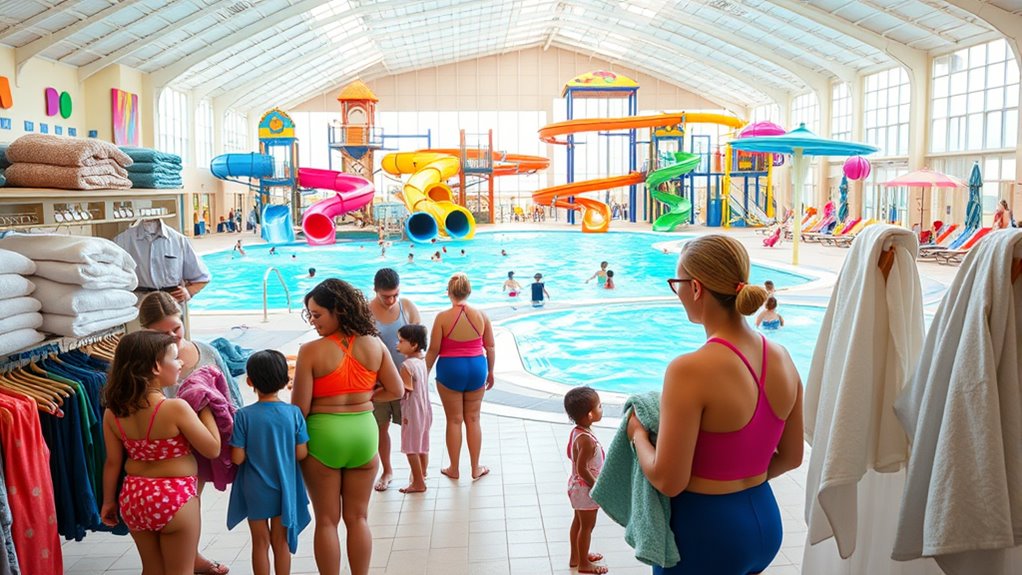
Before heading to the water park, it’s important to clarify the park’s towel policies to avoid surprises. Confirm if towels are supplied or if you need to bring your own. If towels aren’t included or limits are strict, pack multiple lightweight, quick-drying towels to cover everyone’s needs. Use waterproof or quick-drying options for efficiency during and after water activities. Consider bringing personal towels to avoid rental or replacement fees, which can add up. For convenience, bring a towel bag or waterproof container to keep wet towels separate. If towels are provided, remember they’re usually for indoor use only and should be left in the park. For walking back to your room or car, carry your own towels to stay dry and comfortable. Planning ahead ensures a hassle-free water park experience. Cookies used to enhance browsing experience can also help you manage your privacy preferences effectively.
Frequently Asked Questions
Are There Any Restrictions on Bringing Personal Towels Into Indoor Water Parks?
You can generally bring your own towels into indoor water parks without restrictions, but some parks might have specific rules. Check beforehand because a few parks require you to return rented towels or may charge if you don’t. Also, be aware of safety or hygiene policies—avoid using towels inappropriately or interfering with others. Bringing your own towel offers convenience, but parks usually provide options like rentals or complimentary towels to suit everyone’s needs.
Can Guests Request Extra Towels if They Have Large Families or Special Needs?
Yes, you can request extra towels if you have a large family or special needs, but policies vary by park. Since there’s no standard process or guaranteed availability, it’s best to contact the park ahead of time to discuss your needs. Most parks don’t advertise specific accommodations, so communicating directly with staff guarantees you’ll receive the appropriate support or arrangements for your situation.
Do Water Parks Provide Towels for Outdoor Pools or Just Indoor Facilities?
Water parks usually provide towels for both indoor and outdoor pools, often through rental or complimentary services. You’ll find that these towels are valid across the entire water park, including outdoor sections. However, policies can vary, so it’s a good idea to bring your own quick-drying towel if possible. In some cases, outdoor pools may require you to bring your own towel, especially at outdoor-only aquatic centers.
Are There Specific Guidelines for Towel Trading or Sharing Among Guests?
You won’t find specific guidelines for towel trading or sharing at most water parks. While sharing might seem casual, parks prioritize hygiene and safety, making personal towels essential. You’re responsible for your own items, and sharing isn’t encouraged. Keep your towel to yourself, especially since hygiene rules focus on cleanliness. If you want extra towels, check if the park offers rentals or sales, but don’t expect formal sharing policies.
What Are the Consequences if Towels Are Not Returned on Time?
If you don’t return your towel on time, you generally won’t face fines, but most water parks expect you to return or properly dispose of towels. Failing to do so might result in being asked to leave or face additional charges if the towel is lost or not returned. To avoid issues, always return your towel to designated bins or follow the park’s specific guidelines for towel management.
Conclusion
Choosing whether to bring or borrow towels at water parks is like steering a wave—both options have their ups and downs. I once forgot my towel and ended up soaking up the fun with a borrowed one, realizing it’s all about your comfort and priorities. By understanding the policies, you can ride the tide smoothly, making your day stress-free. Ultimately, with the right prep, you’ll stay dry, happy, and ready to plunge into the adventure.
